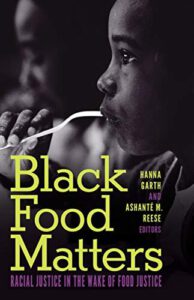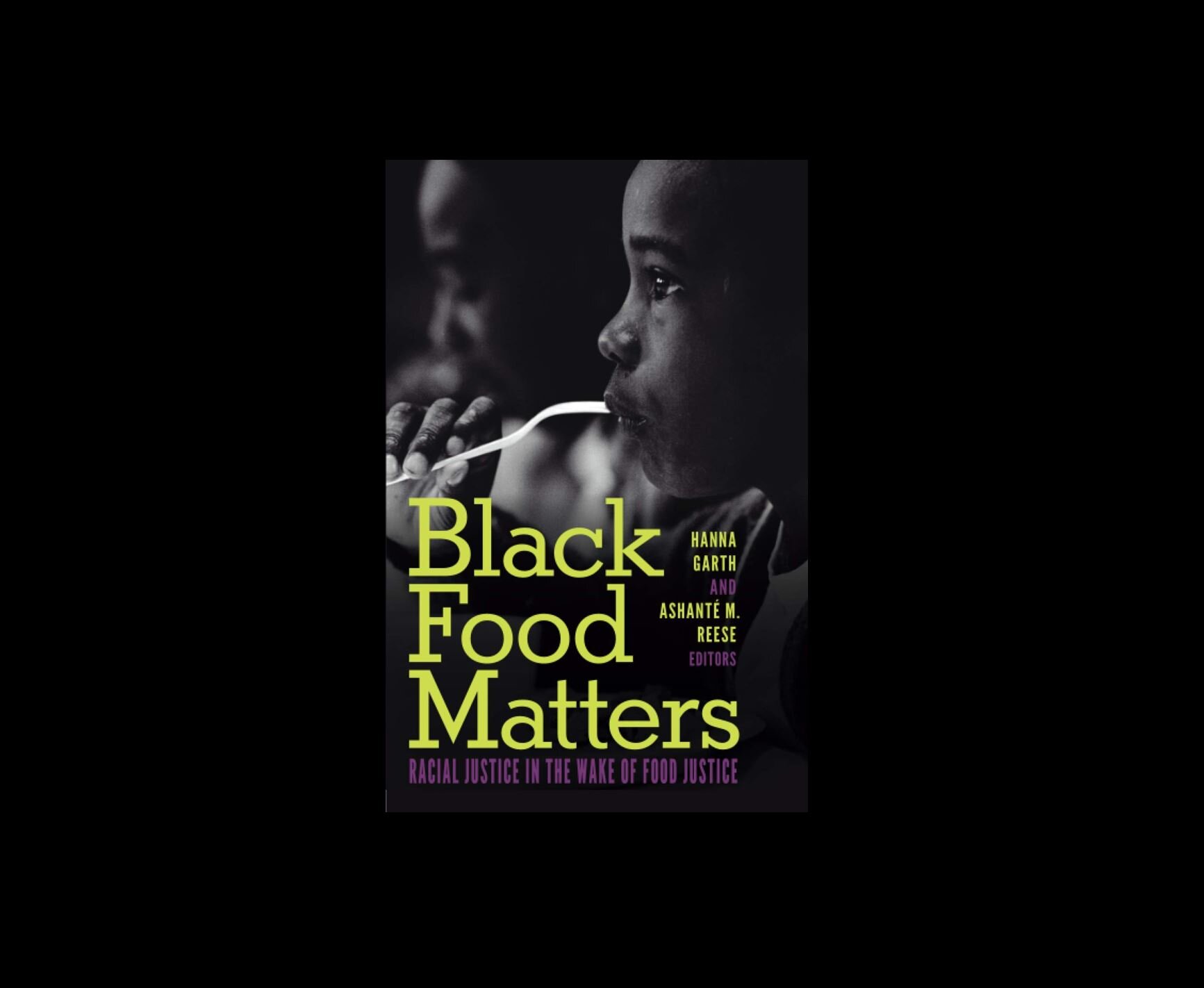Ashanté Reese is the coeditor with Hana Garth of a 2020 book called Black Food Matters: Racial justice in the Wake of Food Justice (University of Minnesota Press). Reese is assistant professor in the Department of African and African Diaspora Studies at the University of Texas at Austin. In this interview with the Urban Food Policy Newsletter, Institute Director Nick Freudenberg asks Reese about her book.

Nick Freudenberg (NF): In Black Food Matters, you and your co-authors show how the history of slavery and the persistence of systemic racism have shaped a food system that produces wide food inequities. You also note that vibrant Black food cultures have the potential to serve as sites of resistance. Can you give our readers some examples?
Ashanté Reese (AR): There is so much good work happening around food right now. From cookbooks that think through and reclaim histories of food in the Black diaspora (Toni Tipton Martin’s Jubilee, Michael Twitty’s Rice, Bryant Terry’s Afro-Vegan), to Black-led food justice organizations and movements (Black Yield Institute, National Black Food and Justice Alliance, Black Urban Growers, Black Church Food Security Network), to really cool social media accounts (@soulphoodie on twitter, @footalksncolor on Instagram). While my work is in the U.S., I am also thinking about work happening around food in Toronto. And also in South Africa. Movements that are about decolonizing diets but also about access to resources like land and capital to build sustainable food infrastructures. I am also thinking about artists who take up some elements of food in their work. Artists like Annalee Davis, who is based in Barbados. In some of her work, she engages sugar and the plantation as themes to explore their contemporary relevance and resonance. These are just the ones that I can list from the top of my head, people who are writing, thinking, cooking, and creating with diaspora, justice, and healing in mind. What is most exciting to me about all these examples is that they cut across modalities and theories.
NF: You also write that Black self-reliance and self-determination have created new forms of food production and distribution. What do you think have been the most important accomplishments of those efforts? Their limitations?
AR: This work fundamentally shifts the urgency and terms on which it is happening. Much of it (though not all) locate the problems of the food system as rooted in exploitation and racism alongside critiques of capitalism. Much of the work I follow is also engaging bigger questions around what it means to live a “good” life, what a citizen requires of (and takes from?) us, and how food intersects with other realms of life and living. A commitment to self-reliance or determination necessarily means that food cannot be addressed in isolation. That work has done a lot to conceptually shift what many of us do as researchers.
NF: In the book, you talk about “wake food work” that builds the resilience of Black communities and cultural forms. What is wake food work?
AR: I don’t know that I would use the phrase wake food work, but I do think there are efforts that do the kind of (re)imagining and care that Christina Sharpe is evoking in In the Wake when she introduces wake work as a methodology. Here, I’m thinking specifically of work that not only makes space for Black life and living but imagines a whole world or systems that make them possible. I think that work requires us to rethink what we want. As Sharpe writes, seeking solutions or negotiating for justice does not always produce the outcomes that we’re seeking. This is in part because the terms on which those negotiations are happening are already terms that are predicated on sacrificing Black life on the altar of capitalism. So, if we know this to be true, what can we imagine, disrupt, and create from that place? A place that isn’t necessarily about reforming systems as much as they are about undergirding life? This is what I think about when I’m visiting farms, gardens, and other projects that food may be the avenue through which they do the work, but the goal is to preserve Black life more broadly. As I allude to in a previous question, I think this is a fundamental difference in approaches and epistemologies. Some work—some very good work—is aimed at the food system. Some work—also some good work—is aimed at creating conditions for Black life to thrive. The latter isn’t always about food.
NF: In both Black and white communities, struggles around food justice take on inequality, systems of oppression (such as low wage food work), and health. In your view, what role does health play is the struggles for racial and food justice? What suggestions do you have for framing health in ways that promote racial and food justice?
AR: There are so many ways that people define health and healthiness, and sometimes those definitions are diverging (or, not compatible). I say that as a preface to say I think a lot about how people feel and move in their own bodies and what that means for how we understand and write about health. Yet, I also understand that how one moves and feels in their own body is in part shaped by racism, access to good healthcare, etc. In some ways, healthy lives – or the ability for people to self-determine what living healthy lives mean to them—is what we’re fighting for. But I also want to note the “living healthy lives” part here, because I want to underscore that concerns about health exceed the biological body.
The question of how to frame health is, in part, a question of scale. If someone is working on a very local level, they have an opportunity to get to know people in the communities they are working with to learn more about their visions for their lives and health. In cases when that is possible, it creates opportunities for researchers and advocates to work with and not just for a population. Of course, that isn’t always possible, so the question becomes: by what measures do we determine health/healthiness/a good life? How do these measures potentially exacerbate inequities? How might they carve paths toward identifying and alleviating them? I have few prescriptions and more questions. What ends do we want our framings of health to serve? How do we (people in power to make decisions, institutions, etc.) respond when someone else does not want to live up to what we believe to be a standard for a healthy life? How do we engage in critical but supportive exchange that is not based on a unidirectional understanding about how knowledge works? (i.e., I have this degree/this expertise and therefore I can tell you what is best for you). Obviously, it doesn’t usually sound that way, but what I’m getting to is that there are many examples where standards are set, and then used as parameters (sometimes punitively so) in ways that reinforce a top down approach. When and where we can disrupt those approaches, we absolutely should.
NF: Thanks so much and thank you for your inspiring work.
